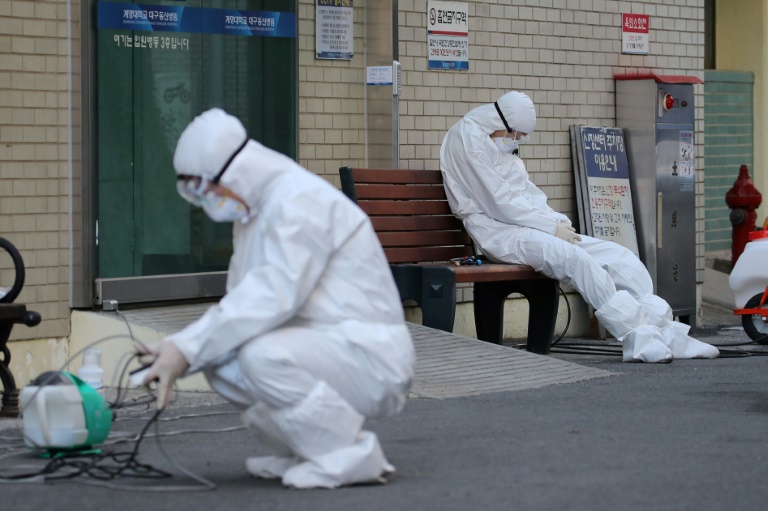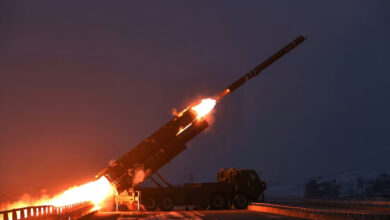
The deadly coronavirus epidemic spread further outside China on Monday with a surge of infections in South Korea making it the biggest hotspot abroad, while authorities in Europe and the Middle East battled worsening outbreaks.
The number of fatalities in China also continued to soar, with 150 more confirmed deaths taking the official death toll to nearly 2,600.
Chinese authorities insist they are making progress in containing the virus, citing slowing infection rates thanks to unprecedented travel lockdowns and quarantines in or near the outbreak’s epicenter.
But a rising number of new cases and deaths in other parts of the world have deepened fears about a potential pandemic, with South Korea, Italy and Iran emerging over the past week on the frontlines.
Bahrain and Kuwait also announced on Monday their first cases of the virus, as authorities in the Middle East sought to clamp down on people travelling and spreading the disease following eight deaths in Iran.
South Korea has seen a rapid surge in infections since a cluster emerged from a religious sect in the southern city of Daegu last week.
Another 161 infections and two more deaths were reported in South Korea on Monday, bringing the total cases to more than 700 people — the most outside China.
South Korean President Moon Jae-in over the weekend raised the country’s virus alert to the highest “red” level, as kindergarten and school holidays were extended nationally.
The start of the new K-league football season, scheduled for this weekend, was also postponed on Monday.
At the main high-speed train station in Daegu, a normally bustling city of 2.5 million people, just a small trickle of commuters were seen.
A long line of cabs waited for passengers outside the station, and the streets were eerily still, with masks and gloves standard for the few out and about.
– Football, fashion curbed –
In Italy, where more than 150 people have been infected and three have died, several Serie A football games were postponed while the Venice Carnival was cut short and some runway shows were cancelled at Milan Fashion Week.
More than 50,000 people in about a dozen northern Italian towns have been told to stay home, and police set up checkpoints to enforce a blockade.
In Iran, authorities ordered the closure of schools, universities and cultural centres across 14 provinces following eight deaths — the most outside East Asia.
The outbreak in the Islamic Republic surfaced on Wednesday last week and quickly grew to 43 confirmed infections, prompting neighboring countries to close their borders.
Nearly 30 people outside of China have been confirmed to have died after contracting the virus. Nearly 30 countries have reported infections.
In China, the confirmed death toll stood at 2,592 on Monday after 150 more people died of the virus.
The number of confirmed new cases fell compared with the previous day to 409, taking the country’s total infections over 77,000.
In a sign of China’s growing confidence, a month-long quarantine in Wuhan, a central city where the virus first emerged in December, was partially eased on Monday.
Wuhan authorities said healthy non-residents, people with other medical conditions and those doing virus prevention work may leave the city of 11 million people.
– Economic toll –
The virus is taking an increasingly heavy toll on the global economy, with many factories in China closed or subdued due to quarantines, and global travel choked.
Stock markets in Asia fell on Monday following the surge in infections in South Korea and weekend developments across Europe and the Middle East.
“While the coronavirus is probably slowing in China, it is speeding up elsewhere,” said Charles Gillams, at RJMG Asset Management.
The International Monetary Fund warned Sunday that the epidemic was putting a “fragile” global economic recovery at risk.
G20 financial chiefs also voiced concern about its ripple effects around the world.
Only about 30 percent of China’s small- and medium-sized enterprises have resumed work, an official said Monday.
Chinese President Xi Jinping acknowledged Sunday that the virus had become the country’s “largest public health emergency” since the founding of the People’s Republic in 1949.
“This is a crisis for us and it is a big test,” Xi said in comments reported by state television.
Officials are expected to decide Monday whether to postpone China’s annual parliament meeting for the first time since the Cultural Revolution in the 1960s.
burs-lth/kma
Image: YONHAP/AFP / – South Korea has seen a rapid surge in infections since a cluster emerged from a religious sect in the southern city of Daegu last week




